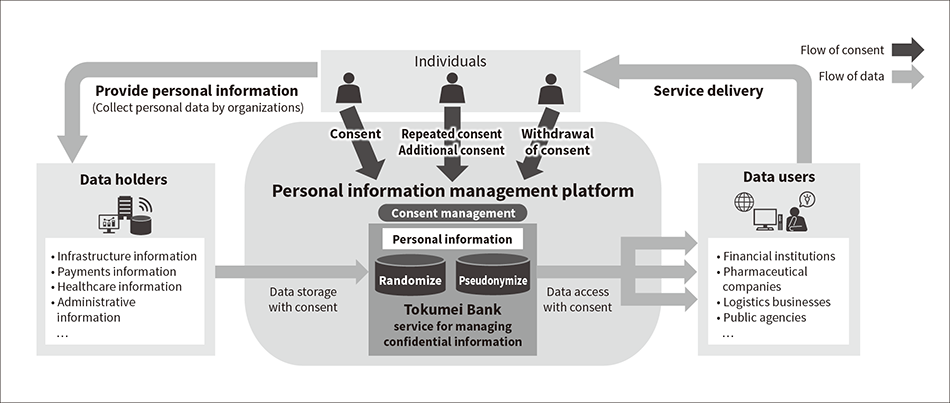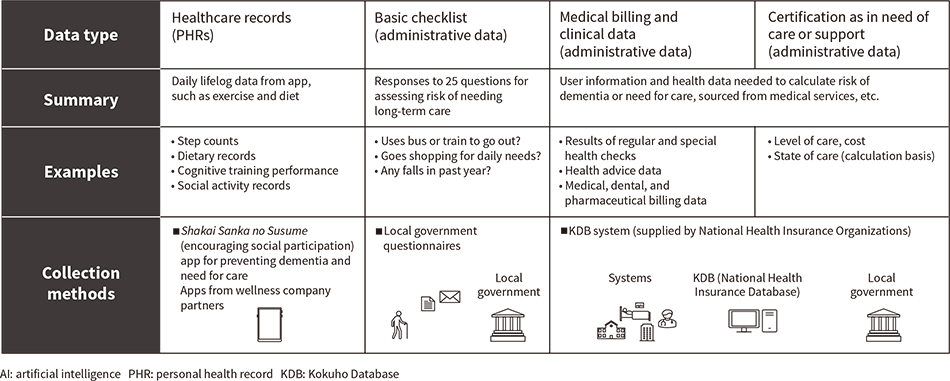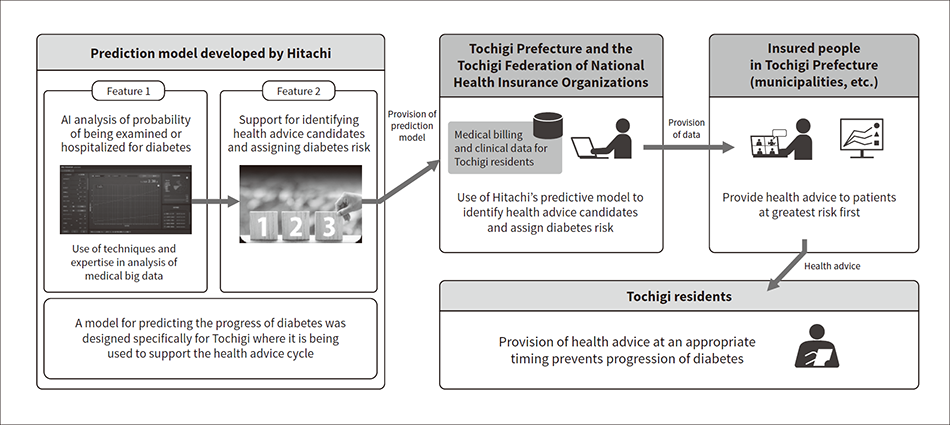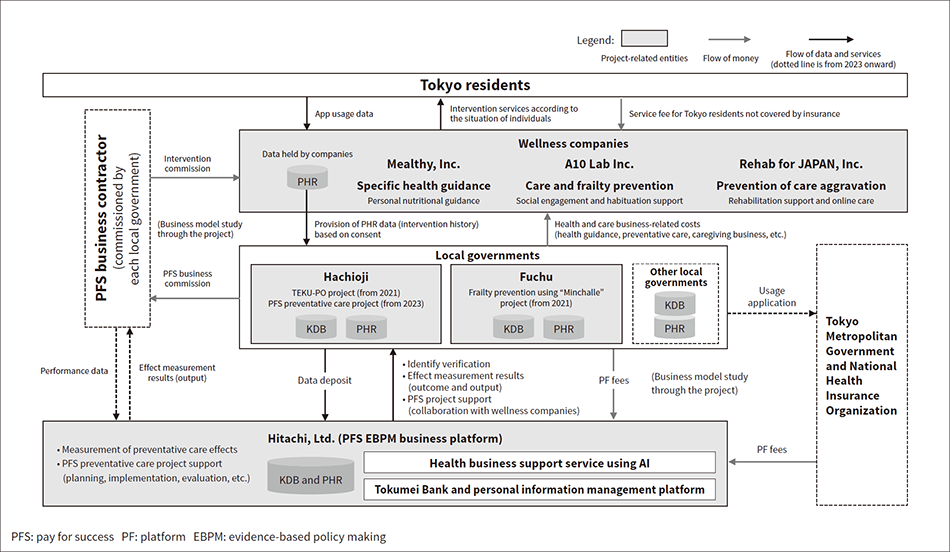Hitachi has started work on building an EBPM business platform as part of the Tokyo Metropolitan Government’s Project Support for Creating Next-generation Wellness Solutions for FY2022. The project includes the development of a new EBPM business platform utilizing a Hitachi secure personal data platform and AI analytics for nursing care, health, and medical big data as well as verifying assessments of the outcomes of work by Hachioji and Fuchu cities on preventive care (pre-emptive measures to avoid the need for long-term care). This article describes the core personal data platform and big data AI analytics along with the EBPM business platform, which leverages co-creation with local government and startup businesses.




Given estimates that appropriate preventive care (pre-emptive measures to avoid the need for long-term care) by the government could save an annual JPY3.2 trillion in benefit payments, there is a strong public interest in high-quality preventive services with regard both to improving lifetime quality of life (QoL) and putting finances on a better footing(1). Moreover, private-sector businesses, too, have a part to play if the government is to achieve the broad-based delivery of services to residents in a way that makes the most of its available resources. Meanwhile, recognizing the benefits of pursuing “wise spending” and the use of private-sector services, government is adopting pay-for-success (PFS) practices, a form of public-private partnership whereby payments are linked to improvements in performance indicators designed to resolve administrative issues(2). Unfortunately, the inability to assess the cost-benefits of preventive measures is an obstacle to the broader adoption of PFS and is holding back the introduction of private services. The fundamental difficulty with measuring the benefits of preventive measures is that the relevant data is so widely scattered. This includes data on what measures have been used and by whom as well as data on the outcomes of these measures, such as healthcare records and the results of medical checkups or certification for requiring care or support. That is, there is no mechanism in place to consolidate this data for use as evidence to assess program outcomes.
In response, Hitachi is working with local government and startup businesses to develop an evidence-based policy making (EBPM) business platform to underpin PFS-based preventive care programs, undertaking this as part of the Tokyo Metropolitan Government’s Project Support for Creating Next-generation Wellness Solutions for FY2022(3). This article presents a summary of this project and describes its core features, namely a secure personal data platform and the AI analytics applied to nursing care, health, and medical big data.
Tokumei Bank (anonymous bank) is a cloud service that utilizes a type of secure computing called searchable encryption, meaning it can search information that has been stored in randomized form(4). Along with reducing the risk of data leaks, the technology also makes it easier to comply with relevant laws and guidelines, with no encryption or decryption keys being held in the cloud (or sent over communication links) (see Figure 1). Whereas past practices required data to be decrypted in the server memory before it could be searched, searchable encryption avoids this need for decryption. When used in the management of personal information, a balance is struck between data usefulness and the protection of individual rights and interests by randomizing details such as name or date of birth that could identify an individual and handling other information in the form of pseudonymized data. Also, practical uses tend to involve searching through the data. For this reason, searchable encryption has previously been used in a wide range of secure computing applications, including many instances where Hitachi has used it to handle sensitive information such as patient records and other healthcare information, resident data, and in Japan’s Individual Number (so-called “My Number”) system.
Figure 1 — Management of Personal Information Using Searchable Encryption Searchable encryption allows encryption keys and data to be held separately, something that was difficult to achieve using previous search techniques. It randomizes personal information to significantly reduce the risk of information leaks. It allows users search data without decryption and is applicable to a wide rage of works.
Searchable encryption allows encryption keys and data to be held separately, something that was difficult to achieve using previous search techniques. It randomizes personal information to significantly reduce the risk of information leaks. It allows users search data without decryption and is applicable to a wide rage of works.
The personal information management platform provides infrastructure for sharing information with the consent of the individual concerned and is compatible with the demand that has arisen over recent years for managing information based on the concept of self-sovereign identity (see Figure 2)(5). Information is aggregated and collated on an individualized basis by collecting it from the data holder, subject to consent. Consent for this collated information can be given on an item-by-item basis, with the provision of data to users being governed by these settings. The platform is built on the Tokumei Bank service for managing confidential information, where the details that can identify an individual are randomized and other information is handled in the form of pseudonymized data. This pseudonymized data can be shared with other applications by means of an open application programming interface (API). Limiting access to pseudonymized data ensures a high degree of security in its use.
By collecting and aggregating different forms of information in this way, the personal information management platform maximizes the value of personal information and provides ways of delivering value to both individuals and society by making that information available subject to the consent of the individual concerned.
Figure 2 — Block Diagram of Personal Information Management Platform By combining functions for the dynamic management of individual consent with the Tokumei Bank service for managing confidential information, the platform provides a mechanism for greater security in the storage and distribution of personal data in the cloud.
By combining functions for the dynamic management of individual consent with the Tokumei Bank service for managing confidential information, the platform provides a mechanism for greater security in the storage and distribution of personal data in the cloud.
Through its involvement in the healthcare services of medical insurers, including local governments, Hitachi has acquired analytical techniques and expertise in medical data, including health checkup data, treatment data, and nursing care data. It also supplies operational support services that make use of AI. This section explains what data is needed for the collation and analysis of the personal health records (PHRs) and other medical data held by local governments that forms the basis of this business.
Table 1 lists the PHR and other nursing, health, and medical data held by local governments. Before the preventive and other benefits of PHR or health business support services that use AI can be analyzed, the nursing care, health, and medical data held by local governments and the data held by PHR services first need to be aggregated. This is done by assigning keys that identify the individual concerned in data held by the National Health Insurance Database (Kokuho Database, KDB) and PHR services. In the case of nursing care data, to provide vital data that sheds light on the daily living habits of elderly people, the KDB system has started collecting data such as responses to basic checklists or questionnaires conducted at places where the elderly congregate to enable the statistical analysis of big data that covers lifestyle as well as past results of nursing care services.
Table 1 — PHR and Other Nursing, Health, and Medical Data Held by Local Government Before AI analysis can take place, the nursing, health, and medical big data to be used in the analysis needs to be aggregated first.
Before AI analysis can take place, the nursing, health, and medical big data to be used in the analysis needs to be aggregated first.
One example of a support service that uses AI was launched in Tochigi Prefecture in June 2021 with the goal of slowing the progression of diabetes(6) (see Figure 3). Past practice was to manually select who receives health advice from a long list of candidates based on the Tochigi Prefecture Program for Preventing Aggravation of Diabetes, selecting on the basis of factors such as age, gender, and medical history so that advice is provided to as many insured patients at high risk of diabetes as possible given the limited human resources available. With the new service, expertise from the Risk Simulator for Insurance, a Lumada solution for the analysis of medical big data, was used to build a predictive model specifically for predicting the progression of diabetes. It utilized eight years of medical and pharmaceutical billing details and clinical data that had been anonymized to prevent the identification of individuals. By allowing Tochigi Prefecture and the Tochigi Federation of National Health Insurance Organizations to provide a list of health advice candidates that includes their degree of diabetes risk, it is hoped that this will significantly reduce the cost to municipalities. Services for assessing the effectiveness of their healthcare operations have also been provided to other local governments. Along with making health advice more efficient, the use of big data analytics and AI by these services is also helping to address the challenges that healthcare and illness prevention pose to local governments.
Figure 3 — AI-based Health Business Support Service for Tochigi Prefecture The figure shows how Risk Simulator for Insurance was deployed in Tochigi Prefecture. By enabling efficient business planning and in-depth health advice, Hitachi’s analytical techniques and expertise in medical big data are being used to slow the progression of diabetes.
The figure shows how Risk Simulator for Insurance was deployed in Tochigi Prefecture. By enabling efficient business planning and in-depth health advice, Hitachi’s analytical techniques and expertise in medical big data are being used to slow the progression of diabetes.
As part of the Tokyo Metropolitan Government’s Project Support for Creating Next-generation Wellness Solutions for FY2022, Hitachi has been working on the development of an EBPM business platform for preventive care that is designed to work with PFS-based programs(3). The work is based on a Hitachi secure personal data platform and AI analytics for nursing care, health, and medical big data described above. Undertaken in partnership with Hachioji City, Fuchu City, A10 Lab Inc., Rehab for JAPAN, Inc., and Mealthy Inc., this project for putting evidence-based practices in place to help people avoid having to go into long-term care is made up of two separate initiatives.
Hitachi is working on an EBPM business platform for measuring the benefits of preventive measures in partnership with Hachioji and Fuchu cities, both of which have made a preventive care smartphone app available as a service to residents (see Figure 4). This includes the secure cloud-based data matching of PHRs held by wellness companies with KDB data on the outcomes of medical and nursing care in the two municipalities. The business platform is built on a platform for personal information management that uses proprietary Hitachi technologies to enable the secure use of personal data. By utilizing AI-based health business support services and techniques for big data analytics, such as explainable AI, the business platform can also calculate outcomes such as the size and associated benefits of care and medical cost savings and reductions in the percentage of people certified as in need of support or care. The goal is to enable the implementation of evidence-based business planning and assessment of the operational performance of local government.
The project has included the trialing of preventive care programs in Hachioji and Fuchu cities along with progress on establishing ways of using data to assess how well different measures work.
Figure 4 — Overview of Business Envisaged as End Goal of this Project The EBPM business platform uses the Tokumei Bank for the secure management and data matching of KDB and PHR data, and AI to measure the business outcomes. The services provided to local government include support for PFS-based preventive care programs.
The EBPM business platform uses the Tokumei Bank for the secure management and data matching of KDB and PHR data, and AI to measure the business outcomes. The services provided to local government include support for PFS-based preventive care programs.
One use case for evidence-based preventive care involves work on establishing a sustainable preventive care program as a public-private partnership. This draws on efforts to promote commercialization by the Tokyo Metropolitan Government’s Project Support for Creating Next-generation Wellness Solutions for FY2021. Undertaken in partnership with Hachioji City, A10 Lab, Rehab for JAPAN, and Mealthy, this study is working toward establishing PFS-based preventive care programs and is looking at the use of the EBPM business platform to assess their outcomes. In anticipation of widespread use across local governments grappling with preventive care, the goal is to use this work as a basis for establishing a service model that will support PFS-based preventive care programs that operate in partnership with wellness companies.
This article has presented the technologies used in the EBPM business platform and described the work done as part of the Tokyo Metropolitan Government’s Project Support for Creating Next-generation Wellness Solutions for FY2022. In the future, Hitachi intends to continue its efforts to improve lifetime QoL and control social security costs in an aging society by providing evidence-based measures for preventing the need for long-term care through both the secure use of data and business model innovation.
Considerable assistance was received from the Tokyo Metropolitan Government, Hachioji City, Fuchu City, A10 Lab Inc., Mealthy Inc., and Rehab for JAPAN, Inc. during the work on the Tokyo Metropolitan Government’s Project Support for Creating Next-generation Wellness Solutions for FY2022 described in this article. The authors would like to take this opportunity to express their deep gratitude.